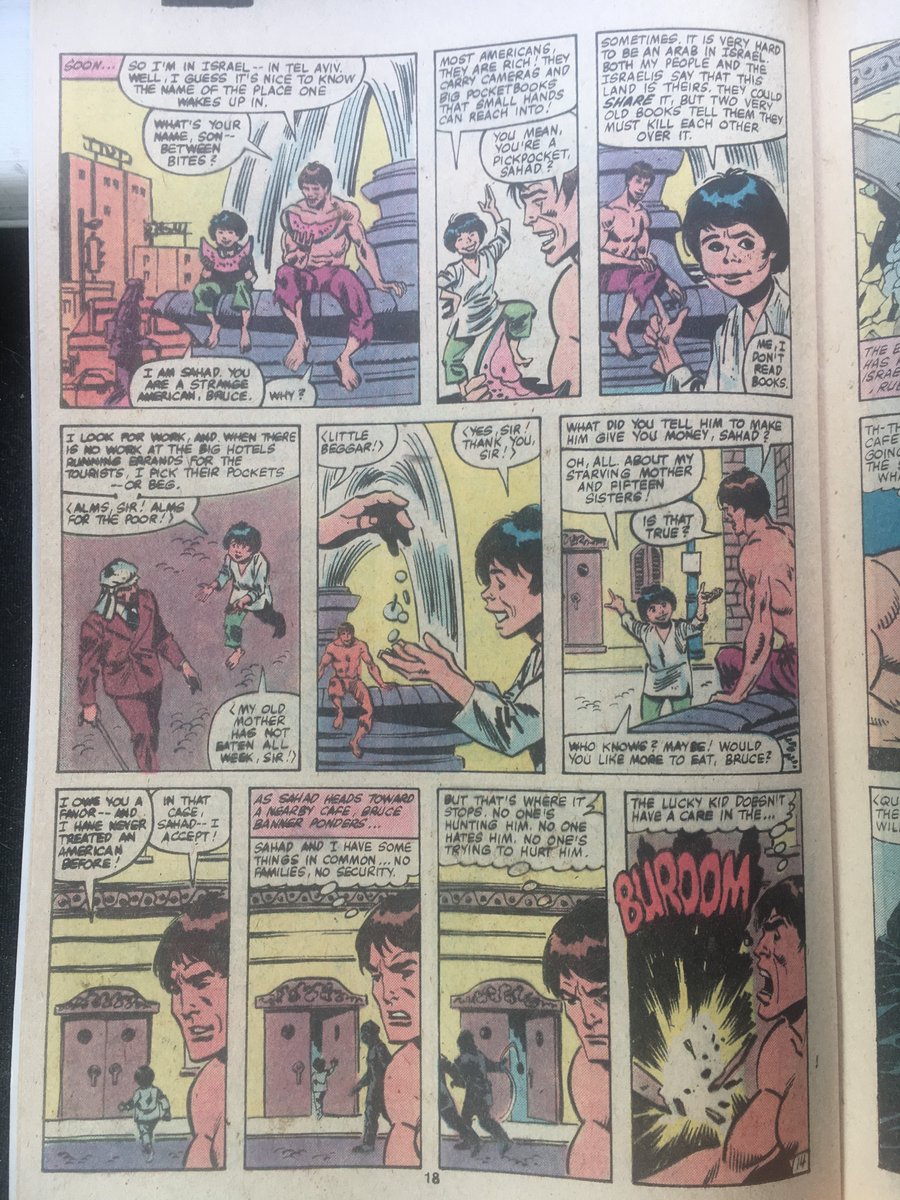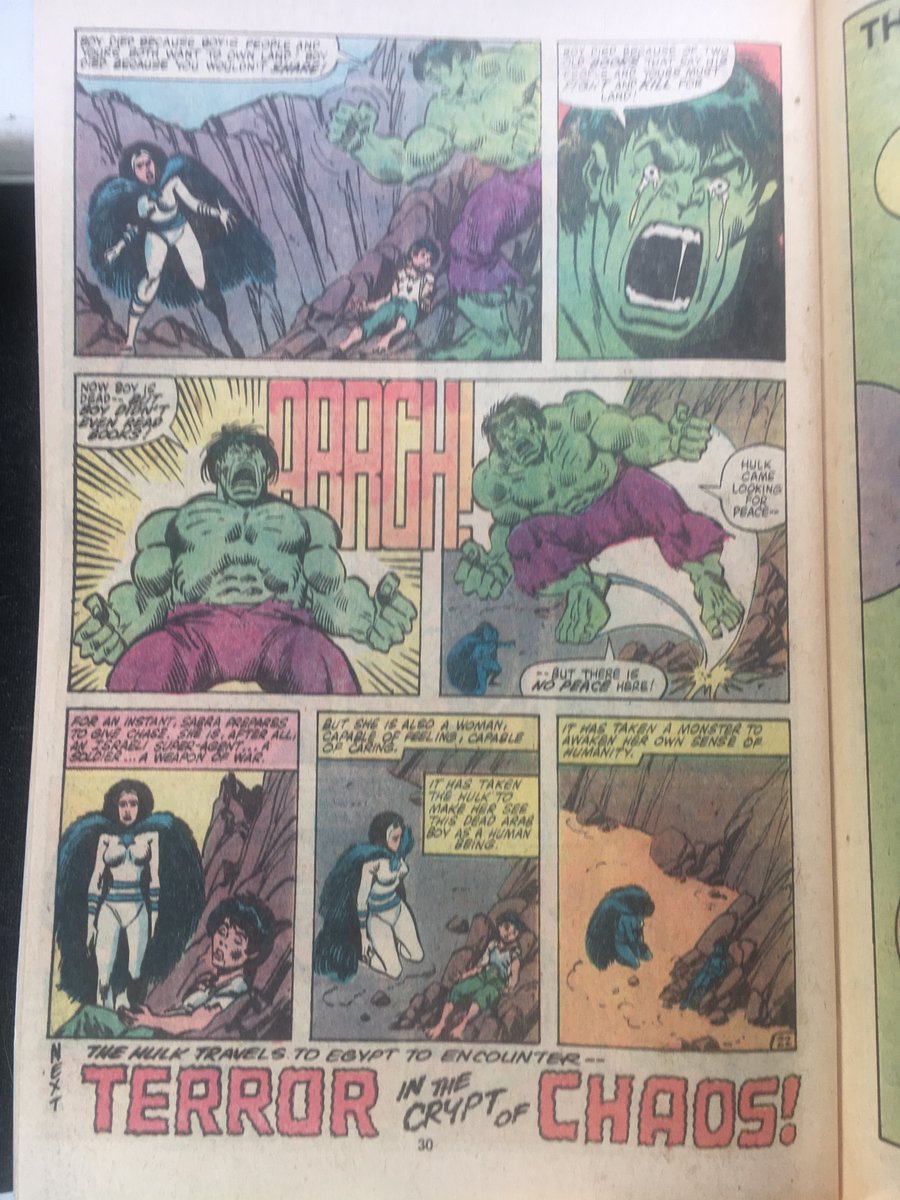And now for something completely different; a thread on Marvel& #39;s Israeli superhero, Sabra, or Ruth Bat-Seraph. Sabra is emblematic of how comics reproduce stereotypes, reduce complex situations to simple solutions with clear right & wrong, but reflect the state of discourse. 1/19
I learned of her existence a few weeks ago from some excellent coverage from @Haaretz, after which I immediately ordered the first full comic dedicated to her, published in 1981 in The Incredible Hulk 256 (she appeared briefly in 1980, 40 years ago). https://www.haaretz.com/us-news/.premium.MAGAZINE-not-just-a-mossad-agent-marvel-s-israeli-superheroine-sabra-turns-40-1.9030357.">https://www.haaretz.com/us-news/.... 2
She is a police officer by day, but the first superhero developed by the Israeli military. Acc. to the comic, "The word Sabra denotes a native-born Israeli. [It] derived from..a prickly pear possessed of a sweet interior, & a spiny outer surface to protect it from its enemies." 3
Her outfit is modeled on the Israeli flag, blue & white with the star of David. Alongside flight & super strength, Sabra can shoot... "energy quills," clearly based on the thorns on the Sabra fruit itself. The character of Sabra is intended as the embodiment of Israel. 4
Sabra encounters Bruce Banner/the Hulk after he flees from the US military aboard a cargo ship that docks in Tel Aviv. Frightened awake upon arriving, he turns into the Hulk and creates quite a stir, leading to a clash with the Israeli military. 5
Turning back into human form, Bruce Banner runs into a market and encounters a young Palestinian boy named Sahad, who is being chased for stealing a watermelon. Banner divides the spoils with the boy as they chat. 6
Sahad tells Banner "sometimes it is very hard to be an Arab in Israel. Both my people and the Israelis say that this land is theirs. They could share it, but two very old books tell them they must kill each other over it." Some oversimplification for you! 7
Sahad also tells Bruce "Me, I don& #39;t read books." In this issue we encounter only two types of Arabs in Israel; terrorists, and a kindhearted illiterate child thief/con-artist. As for Israelis, we only encounter police officers, soldiers, and Sabra. Not good. 8
Sahad explains how he tricks tourists into giving him money by telling them false tales of woe about his "starving mother and fifteen sisters." When asked if the story is true, Sahad explains "who knows? Maybe!" Yikes. 9
Sahad enters a cafe to get more food but is killed by a blast in which "terrorists" declare "In the name of Arab sovereignty over these lands, we deal retribution to those who would steal it from us!..quickly brothers! The Israeli military will.. arrive! Slay any who yet live" 10
Seeing Sahad& #39;s body, Banner turns into the Hulk & kills the terrorists. Sabra arrives & mistakenly thinks the Hulk is in league with the terrorists. This is the 1st of a number of misogynistic asides, where Sabra& #39;s current "reactions are not dictated by logic." Womp Womp. 11
The Hulk takes Sahad& #39;s body and flees, with Sabra in pursuit. Here comes the denouement of the story, as the savage Hulk informs Sabra that the Israelis and Arabs are the true savages, mimicking Sahad& #39;s geo-political analysis: 12
"Boy died because boy& #39;s people & yours both want to own land! Boy died because you wouldn& #39;t share! Boy died because of two old books that say his people & yours must fight and kill for land! Now boy is dead - but boy didn& #39;t even read books!" 13
And the final salvo "Hulk came looking for peace - but there is no peace here." 14
Sabra& #39;s reaction is again couched in unmistakable misogynistic tropes: "Sabra prepared to give chase, she is, after all, an Israeli super agent... A soldier.. a weapon of war. But she is also a woman, capable of feeling, capable of caring." 15
And, just in case we missed the point of the savage hulk pointing out the inhumanity of the various actors in the conflict "It has taken the hulk to make her see this dead arab boy as a human being. It has taken a monster to awaken her own sense of humanity." 16
Needless to say, no one looks to comics for incisive analysis of deeply entrenched political/religious/historical conflicts. But the reproduction of tropes about Arabs, Israelis, women, the conflict, is often the primary vehicle by which many readers are exposed to the issues. 17
At the same time, the comic reflects the mainstreaming of a more symmetrical view of the conflict in the US, in which Israel is not by default in the right, and in which both sides boast equal claims to the land & may also be equally accountable for the conflict& #39;s perpetuation.18

 Read on Twitter
Read on Twitter
![She is a police officer by day, but the first superhero developed by the Israeli military. Acc. to the comic, "The word Sabra denotes a native-born Israeli. [It] derived from..a prickly pear possessed of a sweet interior, & a spiny outer surface to protect it from its enemies." 3 She is a police officer by day, but the first superhero developed by the Israeli military. Acc. to the comic, "The word Sabra denotes a native-born Israeli. [It] derived from..a prickly pear possessed of a sweet interior, & a spiny outer surface to protect it from its enemies." 3](https://pbs.twimg.com/media/EgMMAkTXoAU8QAE.png)










